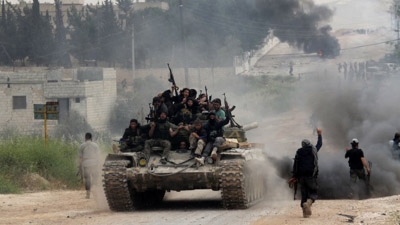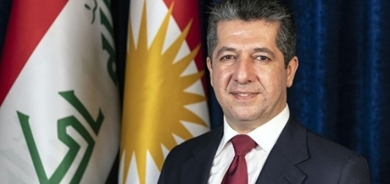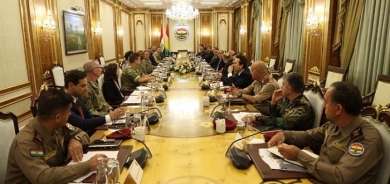Are there any ‘moderate’ rebel groups left in Syria?
June 13, 2015
From Media

In its fight against the Islamic State (IS) group in Syria, the US-led coalition has a tricky task finding moderate rebel groups among the plethora of mostly Islamist organisations fighting both the Damascus regime and each other.
With their recent air strikes against the IS group in northern Syria, the coalition may have muddied the waters further by lending indirect support to the al Qaeda-linked al-Nusra Front.
The international coalition carried out strikes against the IS group during a battle between IS militants and al-Nusra Front fighters on June 7 in the northern province of Aleppo.
The raids took place at Aazaz, near the Turkish border, a strategically important town that Abu Bakr al-Baghdadi’s IS forces had been trying to capture for days, seeing it as an important staging post for arms and fighters coming into the country.
Some analysts, in particular the UK-based Syrian Observatory for Human Rights (SOHR), view the coalition’s latest intervention as a significant break from its established modus operandi of targeting IS group strongholds and supporting Kurdish forces fighting the IS group.
"It's the first time that the international coalition has supported non-Kurdish opposition forces fighting the Islamic State," Observatory director Rami Abdulrahman told AFP, who said the raids gave “indirect assistance to al Qaeda”.
Despite sharing a jihadist ideology, al-Nusra and the IS group are fierce rivals, with the IS group seeking to expand its self-declared "caliphate" in the territory it holds in Syria and Iraq.
Al-Nusra pledges allegiance to al Qaeda chief Ayman al-Zawahiri, but has for now confined its ambitions to Syria and has allied with other Islamist groups fighting the Damascus regime as well as the IS group.
‘The Americans are actually being very pragmatic’
The idea that the American-led coalition is lending active support to al Qaeda could not be further from the truth, according to FRANCE 24’s specialist in jihadist groups Wassim Nasr.
‘It’s unimaginable,” he said while insisting that last week’s air strikes at Aazaz represent neither a change in strategy nor a helping hand to al Qaeda.
“The Americans see IS and al-Nusra in much the same light,” he said, adding that one of the first air strikes against Islamist rebels in Syria had targeted al-Nusra and that the vast majority of jihadist leaders killed in coalition air strikes belonged to al-Nusra and not the IS group.
“The Americans are actually being very pragmatic in their approach,” he said. “By bombing IS positions at Aazaz they were preventing the group from making a significant strategic advance in an area that happens to be vital to other groups, notably the Army of Conquest alliance, to which al-Nusra belongs.”
The coalition’s faltering strategy in the north
Indeed, al-Nusra is certainly not operating alone in northern Syria. The Army of Conquest alliance, made up of a patchwork of insurgent fighting groups, is united only in opposition to the IS group on one hand and against the Damascus regime on the other.
The surviving “moderate” insurgents in Syria have no choice but to join such alliances if they are going to survive.
“The al-Nusra Front has become essential for these groups,” Dr Thomas Pierret, specialist in Islamic and Middle Eastern Studies at the University of Edinburgh, told FRANCE 24.
The coalition, and the Americans in particular, considered the Free Syrian Army (FSA) as their only reliable allies at the beginning of the Syrian civil war. But supporting them has proved to be counterproductive, often turning these “moderates” into targets for jihadists.
A notable case is that of Jamal Maarouf, former head of the Martyrs Brigade (a unit of the FSA and the Syrian Revolutionary Front), who was at one point the go-to man for Washington and Riyadh.
He was accused of corruption then targeted by al-Nusra for receiving support from the Americans, and was eventually forced to flee Syria for Turkey with a large number of his fighters.
Other “moderate” rebel groups, such as Harakat Hazm, have also suffered for working with the Americans, a situation that is hardly encouraging for Washington or for groups looking to work with the coalition.
Are there any reliable ‘moderates’ left?
Which leaves the question: are there any groups in Syria which the West can actually work with, both in the fight against the IS group and also against the Damascus regime?
The situation is made all the more complicated by the fact that rebel brigades are made up of men who are often not jihadists, but are nevertheless influenced by their own religion and can be considered Islamists.
This is the case across northern Syria, and also increasingly in the centre and south of the country. A notable example is Zahran Allouche’s Army of Islam, active in the area around the Syrian capital Damascus, which relies on Saudi Arabian support and can not in any way be considered “moderate”.
In the far south of the country the situation is different, according to Thomas Pierret, who said the influence of southern neighbour Jordan has had a moderating effect on rebel groups operating there.
“The Jordanians, like the Americans, are much keener on FSA-type rebel groups,” said Pierret. “Unlike Turkey, Jordan’s secret intelligence services are highly active and well placed to push the insurrection in the direction that it wants.”
The strategy hasn’t been without success, he said, pointing to the capture of an important Syrian military base at Deraa on June 9 by a group of Free Syrian Army fighters – proof that the FSA still has an influence in the ongoing conflict and that there are still insurgent groups in Syria that can be considered “reliable”.
FRANCE 24’s Wassim Nasr is not so sure: “There’s nothing to say that the coalition strategy that has failed in the north will not also fail in the south.”
France24











